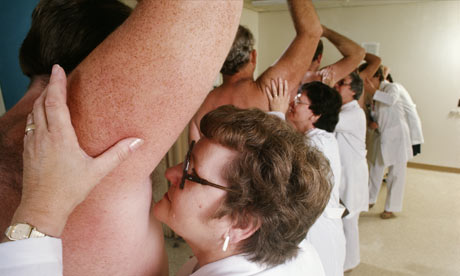
How come only my armpits smell?
Each square centimetre of skin contains around 100 sweat glands. The sweat that cools you down is released from eccrine sweat glands, which are found all over the body but especially in the palms, feet and armpits. They secrete the salty wet sweat that causes sweat patches. A second type of sweat gland, the apocrine gland, is responsible for body odour. These secrete a type of mucous that is broken down by bacteria on the skin to produce the characteristic smell. No one's sure what the purpose of these glands are - if they're supposed to be the body's natural perfume then maybe it's our sense of smell that is to blame. Fortunately for us, if not for deodorant manufacturers, apocrine glands are found mainly in the armpits and genital regions.
How do deodorants work?
There is a big difference between deodorants and antiperspirants, as Dr Mark Goodfield, president of the British Association of Dermatologists, explains. "An antiperspirant is an agent which acts to diminish sweating and doesn't necessarily include a perfume. Antiperspirants tend to contain aluminium salts which thinly cover the sweat glands and diminish the amount of sweat leaving the area to which it is applied. A deodorant serves to counter the bacteria that react with the sweat to create a smell." They also contain perfume to hide the smell of body odour.
Are antiperspirants harmful because they block your pores?
Although the armpits have a high concentration of sweat glands, there are plenty elsewhere so blocking these doesn't affect your body's heat regulation. Ten years ago a rumour spread on the internet that blocking sweat glands prevents toxins from escaping the body, which can accumulate in the lymph glands and cause cancer. The rumour turned out to be a hoax: lymph glands are completely separate from sweat glands and only a tiny proportion of the body's toxins are excreted in sweat.
Is it true that antiperspirants can cause breast cancer?
There have been concerns that the aluminium contained within most antiperspirants may cause breast cancer. A study in 2007 found high levels of aluminium in breast tissue taken from 17 women with breast cancer. However, a lack of comparative data from other body parts or healthy breast tissue makes it hard to draw any conclusions from this study.
There is currently no evidence from any cancer trials to suggest that antiperspirants cause cancer. The biggest study to date was published in 2002 and compared around 1,600 women, half of whom had been diagnosed with breast cancer. Researchers interviewed each woman to establish their armpit hygiene habits and found that neither deodorant nor antiperspirant use led to an increased risk of developing breast cancer. They also looked at shaving before applying deodorant, since breaking the skin while shaving could, in theory, make it easier for aluminium to enter the body. They found no increased risk of breast cancer.
What about natural alternatives?
Fears about the safety of aluminium-based antiperspirants have led to some people switching to natural products offered by brands such as Crystal and Green People. These contain ammonium alum, a mineral salt found in the earth's crust. They claim to prevent odour not by blocking the sweat glands (which is what makes antiperspirants so effective) but by forming a barrier on the skin that prevents bacteria forming. If you fancy making your own natural deodorant, you can try bicarbonate of soda, either on its own or mixed with talcum powder.
What to wear?
The right clothing can make all the difference, according to Goodfield. "Long-sleeved, light and loose-fitting tops made of breathable fabrics such as cotton are perfect for the summer months, as they also offer sun protection while allowing the skin to stay cool." Modern performance fabrics wick sweat away from the body and are good for sports.
How do I know if I'm sweating too much?
Most people sweat appropriately, whether from heat, anxiety or exercise. However, excessive sweating, known as hyperhidrosis, can have a serious effect on people's lives. Anyone who has tried antiperspirants but is still sweating so much that it is interfering with their work or social activities should ask their GP for advice. Excessive armpit sweating is rarely due to an underlying disease; however generalised sweating, particularly at night, may need further investigation. Stronger aluminium chloride-based antiperspirants can be prescribed, although they often cause skin reddening.
If this fails some novel treatments are available. Botox involves injecting a tiny amount of Botulinum toxin into the skin which blocks the nerves that activate the sweat glands. "This treatment usually works very well," says Goodfield. "The effect lasts for between two and six months, although some patients may continue to benefit for 12 months, and the treatment can be repeated."
Iontophoresis, which involves passing a small electric current through a pan of water with the affected area immersed in it, can be effective too, but it is more useful for palm and foot sweating.
• This article was amended on Wednesday 20 May 2009. The original said apocrine glands were found only in the armpits and genital regions. This has been corrected.

